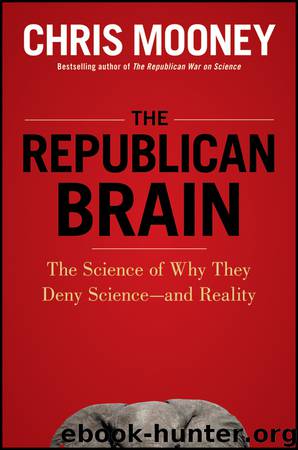The Republican Brain by is Mooney

Author:is Mooney
Language: eng
Format: epub, mobi
Publisher: John Wiley & Sons, Ltd.
Published: 2012-03-09T16:00:00+00:00
So we now can see where the “American culture war of fact,” as it has been called, comes from, and why it has had such pernicious effects.
At the same time, we can also see how the modern conservative movement was, simultaneously, a contingent and uniquely American outgrowth, and yet also classically conservative on a psychological level. It was a powerful and emotional reaction against change. It was driven by leaders who were often Manichean in worldview (or at least adopted this style). It took on a religious character, defending hierarchy, when provoked by demands for more egalitarianism.
Most of all, because of the sharpness of the divide that this created—a true battle of deep seated and irreconcilable worldviews—it left the country completely polarized. Not only were Americans strongly divided politically, but they were highly emotional about that divide: inclined to demonize the other side, to clash vigorously and angrily with little or no understanding.
I needn’t do much to document the nature of our present polarization; it has been done extensively. But it includes explicitly tribal behavior based on party affiliation: people straining everything they perceive through a lens of partisanship. It also includes demographic trends, in which conservatives and liberals—those more and less Open to Experience—are changing where they live based on politics, and self-selecting into “blue” and “red” states.
Another crucial example of this polarization, and one with perhaps the greatest consequences for triggering biased reasoning and divergent views of the facts, involves media choices and how we consume information. For nowadays, people have the ability to opt into streams of political information that reinforce their points of view. This phenomenon has grown so dramatic, and is so psychologically important, that it is the subject of my next chapter.
In a sense, you might think of my analysis of media change as an extension of this argument about conservative think tanks and elites, and how they facilitated the creation of an alternative reality on the right. Simply put, the think tanks made motivated reasoning a heck of a lot easier, because they provided evidence, arguments, and “expertise” in support of conservative positions.
But these were largely for other experts, wonks, policymakers, and journalists to consume, not average citizens. Not the conservative base.
Hence the need for conservative media outlets: radio shows, television stations, and ideological web sites. What this means is that changes in communications technology—and economic changes in the media industry—represent another central “oven” factor that helps to explain the current split over reality.
This factor—which allows people to select themselves into ideologically-reinforcing streams of information, and ultimately to construct their own realities—is so powerful that many have argued that it is the cause of the problem we’re tackling. “People don’t believe whatever they want to believe, they believe whatever they can get away with believing,” says University of California-Irvine motivated reasoning researcher Peter Ditto. In a previous era, Ditto remarks, “you might have wanted to believe something, but you turned on Walter Cronkite that night, and he gave you some facts that were different.
Download
This site does not store any files on its server. We only index and link to content provided by other sites. Please contact the content providers to delete copyright contents if any and email us, we'll remove relevant links or contents immediately.
| Anarchism | Communism & Socialism |
| Conservatism & Liberalism | Democracy |
| Fascism | Libertarianism |
| Nationalism | Radicalism |
| Utopian |
The Secret History by Donna Tartt(19028)
The Social Justice Warrior Handbook by Lisa De Pasquale(12182)
Thirteen Reasons Why by Jay Asher(8883)
This Is How You Lose Her by Junot Diaz(6872)
Weapons of Math Destruction by Cathy O'Neil(6261)
Zero to One by Peter Thiel(5782)
Beartown by Fredrik Backman(5734)
The Myth of the Strong Leader by Archie Brown(5491)
The Fire Next Time by James Baldwin(5423)
How Democracies Die by Steven Levitsky & Daniel Ziblatt(5211)
Promise Me, Dad by Joe Biden(5139)
Stone's Rules by Roger Stone(5078)
A Higher Loyalty: Truth, Lies, and Leadership by James Comey(4946)
100 Deadly Skills by Clint Emerson(4911)
Rise and Kill First by Ronen Bergman(4775)
Secrecy World by Jake Bernstein(4738)
The David Icke Guide to the Global Conspiracy (and how to end it) by David Icke(4696)
The Farm by Tom Rob Smith(4500)
The Doomsday Machine by Daniel Ellsberg(4481)
